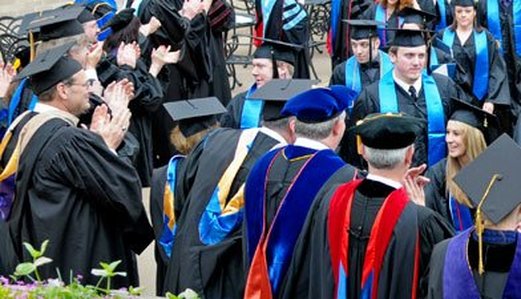 @KarenGrossEdu
@KarenGrossEdu Let's Be Careful: What is the Role of Full Time Faculty vs Adjuncts? By: Karen Gross (Re-Print)
Jeff Selingo's recent piece in WPo addresses "who is teaching your college student." The piece notes that many college students are not taught by full time faculty. The inference is that full time faculty are "better" than adjuncts. And, the piece focuses on classroom learning and engagement with faculty as an important aspect of college success. http://wapo.st/1B8E4bF
We can debate the quality of faculty (full and part time); we can discuss the presence or absence of tenure; we can comment on the pay scale for full and part time faculty; we can address the critical need for student engagement. These are all important topics, worthy of much thinking and discussion.
Here's what is bothering me, the WPO piece misses the following critical issue and in so doing gives a false impression of what college is actually all about. For prospective parents and students, this is something to think about as the time for first year students to arrive on campus approaches: full-time faculty should not only engage with students in the classroom, they engage students in the life of the campus in a myriad of ways. (To be fair, some amazing adjuncts do as well.)
When done well, the faculty see and eat with students in the dining hall; they do presentations in residential halls -- some even live there and serve as a constant role model; they oversee clubs and organizations; they attend campus events (ranging from Convocation to Commencement). They cheer on students at many athletic events. They participate in Open Houses and Admitted Student Days. They talk to prospective students about their futures. They speak to high schoolers. They do on campus presentations and they invite guests to campus to speak and engage with students. (None of this addresses governance involvement.)
As I say often, learning happens in many places and spaces of which the classroom is but one. Full-time faculty make that expansive learning happen. That is why full-time faculty matter -- they are integral to the creation of community -- and it is not just an academic community. It is a living and learning community. Adjuncts can and do participate but it is not the same level of commitment necessarily.....and to be sure, some full time faculty do not engage sufficiently either. (That's another story for another day.)
Point is: Engagement matters -- in and outside the classroom. With full time faculty, that is possible, encouraged, fostered and part and parcel of the role of the professorate. Examples of this abound on campuses everywhere -- two year institutions, four year institutions and graduate programs. Look for and identify faculty who see themselves, and whose institution sees them, as "teachers" in every sense of that word. And, worry about institutions where this does not occur or is not part of the institutional culture.
To read more articles by Karen Gross click here!
Jeff Selingo's recent piece in WPo addresses "who is teaching your college student." The piece notes that many college students are not taught by full time faculty. The inference is that full time faculty are "better" than adjuncts. And, the piece focuses on classroom learning and engagement with faculty as an important aspect of college success. http://wapo.st/1B8E4bF
We can debate the quality of faculty (full and part time); we can discuss the presence or absence of tenure; we can comment on the pay scale for full and part time faculty; we can address the critical need for student engagement. These are all important topics, worthy of much thinking and discussion.
Here's what is bothering me, the WPO piece misses the following critical issue and in so doing gives a false impression of what college is actually all about. For prospective parents and students, this is something to think about as the time for first year students to arrive on campus approaches: full-time faculty should not only engage with students in the classroom, they engage students in the life of the campus in a myriad of ways. (To be fair, some amazing adjuncts do as well.)
When done well, the faculty see and eat with students in the dining hall; they do presentations in residential halls -- some even live there and serve as a constant role model; they oversee clubs and organizations; they attend campus events (ranging from Convocation to Commencement). They cheer on students at many athletic events. They participate in Open Houses and Admitted Student Days. They talk to prospective students about their futures. They speak to high schoolers. They do on campus presentations and they invite guests to campus to speak and engage with students. (None of this addresses governance involvement.)
As I say often, learning happens in many places and spaces of which the classroom is but one. Full-time faculty make that expansive learning happen. That is why full-time faculty matter -- they are integral to the creation of community -- and it is not just an academic community. It is a living and learning community. Adjuncts can and do participate but it is not the same level of commitment necessarily.....and to be sure, some full time faculty do not engage sufficiently either. (That's another story for another day.)
Point is: Engagement matters -- in and outside the classroom. With full time faculty, that is possible, encouraged, fostered and part and parcel of the role of the professorate. Examples of this abound on campuses everywhere -- two year institutions, four year institutions and graduate programs. Look for and identify faculty who see themselves, and whose institution sees them, as "teachers" in every sense of that word. And, worry about institutions where this does not occur or is not part of the institutional culture.
To read more articles by Karen Gross click here!
